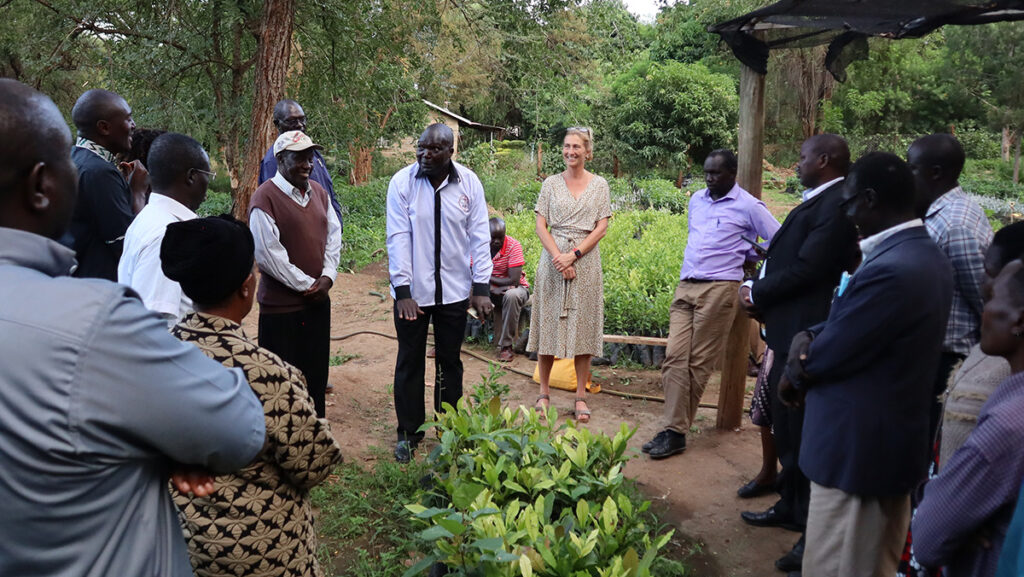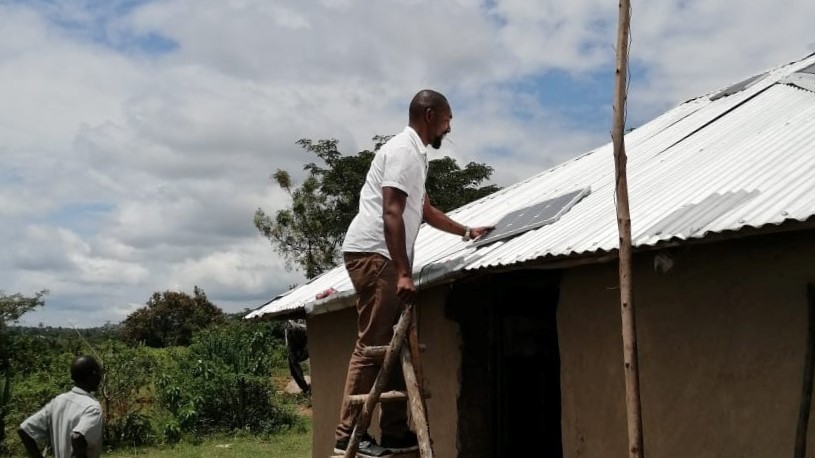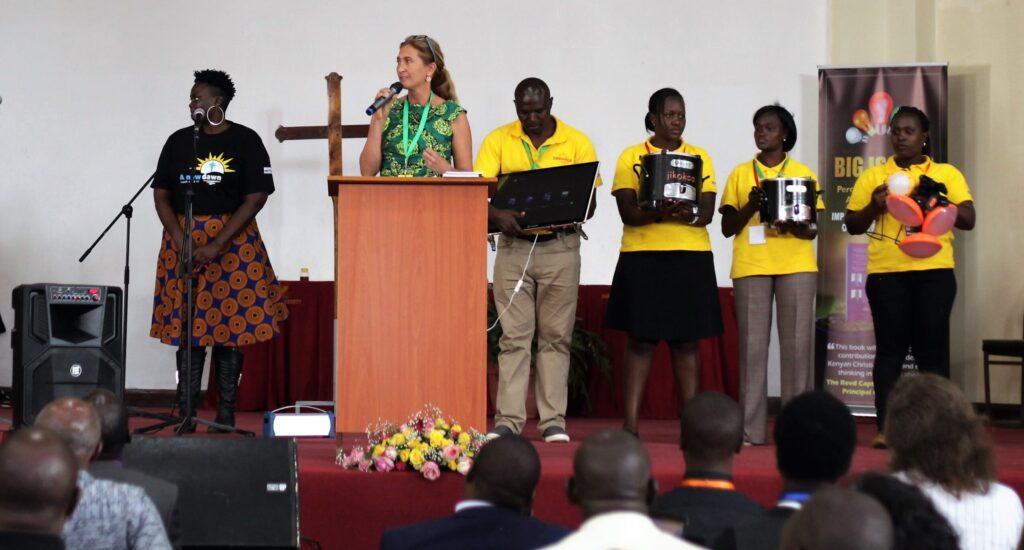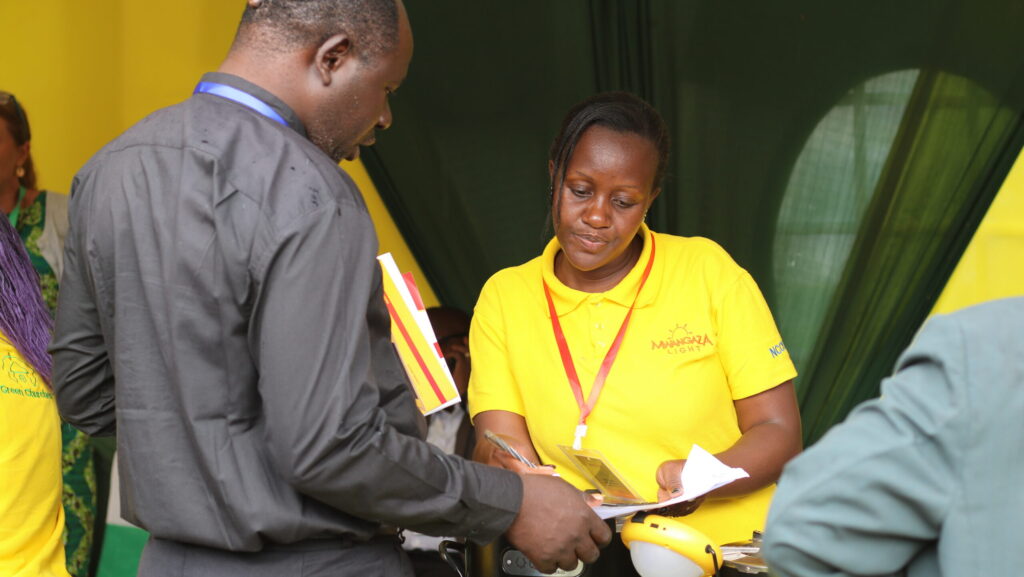Mwangaza Light: Expanding First-time Access to Cleaner Cooking in Rural Kenya
Mwangaza Light is a faith-based social enterprise that partners with churches to enhance energy access, gender equality, and climate action in Kenya. Launched in 2014, the company is both women-founded and women-led. As a last-mile distributor, Mwangaza Light specializes in reaching underserved markets with clean cooking and solar solutions. To date, Mwangaza Light has served about 60,000 households with biomass cookstoves and/or solar home systems.
The Clean Cooking Alliance (CCA) spoke with Catrine Shroff, Founder and CEO of Mwangaza Light, about the company’s unique business model and priority to empower women across the clean cooking ecosystem.
This interview is part of a series of conversations CCA is having with business leaders across the clean cooking sector.

Clean Cooking Alliance (CCA): Can you describe Mwangaza’s Light’s organizational purpose and business model?
Catrine Shroff (Shroff): Mwangaza Light is a faith-based social enterprise that works with churches to reach rural households with clean cooking and solar solutions. It was started by myself and my sister-in-law because we could see a huge gap in reaching people with not just a technology solution, but an actual platform to change behavior. Changing cooking behavior is not just a matter of knowing how much wood you will save; it’s a cultural change, rooted in cooking practices and taste. So, you need to do more than teach people about the technical benefits. We started Mwangaza Light because, through the churches, we can reach people, especially in rural areas, who are otherwise not reached through commercial channels. Here in Kenya, churches are often perceived as “sites of development” and the leaders are considered role models.
CCA: What are the defining characteristics of your customer base?
Shroff: Our customer base is mostly made up of low-income, rural, and peri-rural households; we have few customers in urban areas. Many of our customers are teachers and members of the clergy, but most are farmers. Since church congregations are largely made up of women, we have more women customers than men. And we really manage to reach underserved markets: in a recent customer survey funded by CCA and carried out by 60 Decibels, we found out that, for 98% of our customers, it was their first improved cookstove.

CCA: Could you describe Mwangaza Light’s products and services?
Shroff: Our products are about 80% clean cooking solutions and 20% solar solutions. We view the clean cooking solutions, especially the biomass stoves, as an entry point to the clean energy ladder. The idea is that families start with a biomass cookstove and start saving money and seeing improvements in their quality of life. Then, they use the savings to upgrade to a solar home system. Also, we are developing a strategy where Mwangaza Light would take back smaller solar home systems as people upgrade and resell the secondhand systems.
CCA: Which producers and manufacturers do you work with, and in what capacity?
Shroff: We mainly work with BURN Manufacturing and C-Quest Capital. With BURN, we designed a unique jikokoa for our key partner, the Anglican Church of Kenya. It’s a normal BURN jikokoa but it’s green and has a nameplate dedicated to the “Green Anglicans” movement. This unique design has been important for the church to take ownership of the cookstoves, especially because we launched them during COVID-19 and the Kenyan elections, which made uptake challenging.
With C-Quest Capital, we work on a carbon credit program where we are an implementing partner of rocket cookstoves, which are built into people’s homes. So far, we have implemented about 40,000 rocket stoves and sold 15,000-20,000 BURN stoves.
Looking ahead, we are exploring partnerships with other manufacturers, including a collaboration with ATEC on e-cooking as we have received many requests from the more urban, middle class, women church members who are looking for a cooking solution that serves their needs. We believe we could be a very good distributor for ATEC because the Kenya Power and Lighting Corporation is interested in promoting e-cooking and there’s a strong tradition of collaboration between the state and the church on development for the common good.

CCA: Could you tell us more about your partnerships with faith-based institutions?
Shroff: We try to cast a very wide net. We are in conversation with the Inter-Religious Council of Kenya, which represents Muslims, Hindus, and Christians. We mainly work with mission-based, Episcopalian churches, which have an archbishop and a clear structure all the way down to the village level. We have built a particularly strong partnership with the Anglican Church of Kenya because Archbishop Jackson Ole Sapit is committed to growing a green movement, both within the church and in collaboration with all other religions. We work with the clergy to raise awareness from the pulpit, and then we train people in the congregation to offer their fellow congregants and the community access to information, services, and clean energy solutions.
We also work with churches as an opportunity for advocacy on energy access and making clean cooking a climate justice issue. Sometimes a government minister will listen better to a religious leader than the private sector. In addition, we represent faith-based actors in global advocacy efforts, such as in our work with Power Up Kenya to enhance energy access by faith-based actors at the 2023 Africa Climate Week.
CCA: What financing options do you offer to customers?
Shroff: We offer pay-as-you-go to all our customers, both for clean cooking and solar energy solutions. You cannot sell anything within the clean cooking or solar sector in Kenya that is not on installments. In our system, there’s a down payment to make sure the customer feels an obligation to continue the payment. For biomass cookstoves, payment for a stove is usually completed over 60 days and we don’t charge any interest. For solar solutions, we have a collaboration with the suppliers, but we have to charge some interest simply because, otherwise, we get bad debt.
CCA: How do you think about women’s empowerment in your business operations at Mwangaza?
Shroff: There are so many opportunities for women’s empowerment, both in terms of staff and in terms of end users. I’m very proud to say that the founders of Mwangaza are women. The management team and the next level are 100% women and, within our entire staff, 76% are women. It is possible to grow an enterprise with mostly women, as well as young people. In our local setting, there is an authority when women speak about cooking. When men talk about cooking, it doesn’t have the same authority because they seldom cook. I think that clean cooking is a sector where we need to use the advantage of women’s knowledge and authority.
For the end users of clean cooking, I think there’s a huge potential to improve women’s health and reduce their cooking time; in Kenya, women spend 5-6 hours a day on cooking related activities. We can help change that. There are also a lot of emotional benefits from clean cooking that we rarely talk about. There are women who say that, before they got an improved cookstove, they would have to stay at home until they had finished cooking lunch, or have to shower twice a day because they smelled too much of smoke. Whereas with an improved cookstove, they can leave after or between breakfast and lunch because they don’t smell badly of smoke.

CCA: How do you see Mwangaza Light and the clean cooking sector more broadly evolving over the next 5 to 10 years?
Shroff: I think that carbon credits are here to stay, and I hope that the sector, including Mwangaza Light, will combine carbon credits and commercial sales so that we can reach underserved markets with their energy needs for cooking and power.
I would also like to see more interaction between cleaner cooking and environmental protection, so that when you buy your stove, you also plant trees for sustainable firewood or charcoal production. And I believe e-cooking offers an opportunity for raising awareness far beyond cooking: it could very well increase awareness of climate action. We need to make sure that we keep looking at energy, empowerment, and environment as a nexus instead of different parts.
CCA: Do you have any advice for companies who are interested in getting to scale?
Shroff: Mwangaza Light is currently in the process of scaling. We have learned to be very careful with taking loans. Instead of loans, I think we all should be looking at impact investors. We can give them carbon credits or other benefits as part of the SDGs because we can offer a lot of impact beyond strictly the cooking part.
